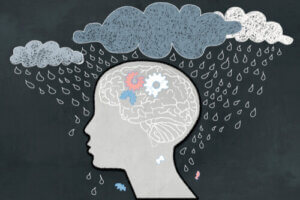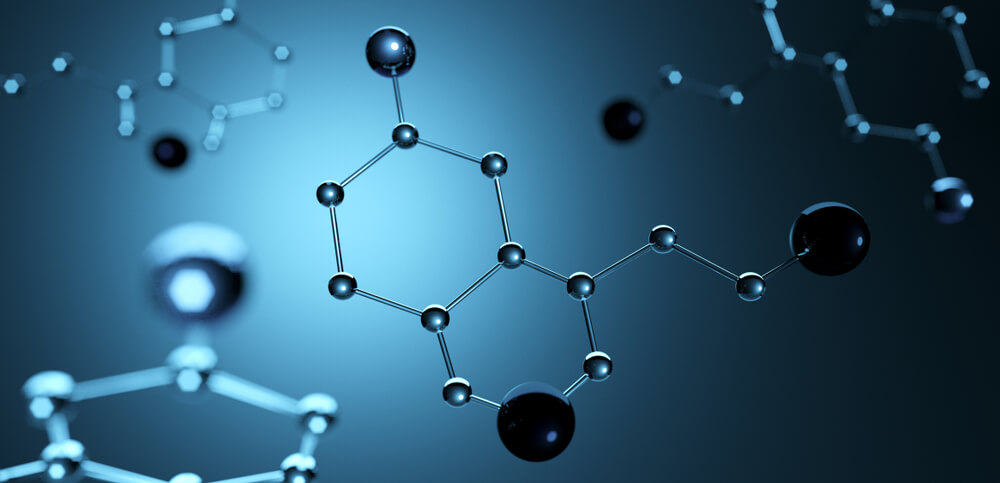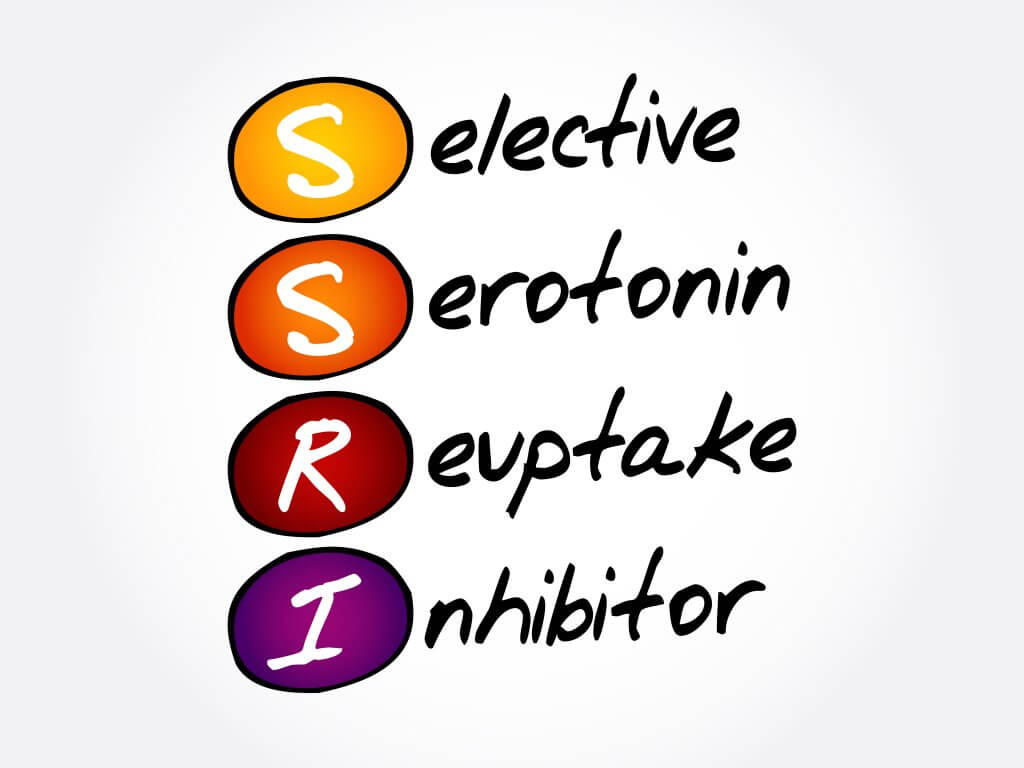Serotonin and Depression: How Are They Related?


Escrito y verificado por el psicólogo Bernardo Peña
Depression is one of the most disabling psychological disorders. Today there are many antidepressant treatments, but not all patients react in the same way. This leads us to investigate the processes involved in depression. What is the link between serotonin and depression?
What is depression?
Depression is a combination of sadness, melancholy, disinterest in activities and life projects, fatigue, lack of energy, feelings of guilt, ideas of death and suicide, attention and memory problems, and sleep and eating disorders. It could also concur with somatic symptoms.
There are several different types of depression. They can generally be mild to very severe, episodic, chronic, or recurrent.
Due to the great impact on health that depression has, an attempt has been made to investigate the environmental and biological factors that contribute to its origin. In the present case, we’re going to focus on the role of serotonin in depression.
You could also read this article on the subject: Fluoxetine: Beating Depression
What is serotonin?
Serotonin is a neurotransmitter that also acts as a hormone. It’s produced mainly in the brain, but also in the digestive system. It’s found throughout the body, and it’s believed to participate in many different physiological and psychological functions.
Curiosities about serotonin
- It has an important role in the human body
- It’s involved in the regulation of our moods
- It regulates appetite and digestion
- It helps to regulate the sleep cycle
- It’s involved in the consolidation of long-term memory
- It influences sexual performance
- There appears to be strong evidence of a link between serotonin and depression, however it isn’t clear whether low serotonin levels cause depression or whether depression causes low serotonin levels.
- Serotonin can be increased naturally through mood regulation, exercise, and diet.

Consequences of having low serotonin levels
Low serotonin levels are often associated with:
- Depressed mood
- Anxiety
- Insomnia
- Aggressiveness
- Low self-esteem and suicidal thoughts
- Digestive problems and constipation
Note that some of these symptoms are also common in depression. However, there isn’t enough empirical evidence to establish a causal relationship between depression and low levels of this neurotransmitter.
Serotonin functions
Among the functions of this substance, we find the following:
- Transmitting nerve signals between neurons
- Regulating bowel movements
- Reducing appetite
- Regulating the mood and favoring well-being
- Inhibiting sexual activity
- Promoting blood clotting
SSRIs for treating depression
Selective serotonin reuptake inhibitors (SSRIs) increase serotonin levels in the synaptic cleft, by preventing this neurotransmitter from being re-absorbed. Therefore, the levels of this substance remain high, thus influencing the mood.
The scientific community seems to agree that SSRIs alleviate the symptoms of depression by increasing serotonin levels in the body. However, the way it works isn’t yet clear.
Similarly, some SSRIs seem to work for some people and not others, so some dissenting scientists argue that increased serotonin levels may not alleviate depression.
Controversy aside, SSRIs are the gold standard for treating:
- Depression
- Anxiety
- Panic attacks
You may be interested in: The Differences Between Anxiety and Depression
SSRI problems
Unfortunately, SSRIs don’t begin to relieve depressive symptoms for about 12-15 days. Therefore, during the first weeks of treatment, depressive symptoms may worsen. In any case, we must attend to the patient’s condition by helping them control their emotions and thoughts, especially if they are suicidal thoughts.

Side effects of SSRIs
SSRIs have some side effects that usually subside after a month of use. The following stand out:
- Insomnia
- Depersonalization or derealization
- Dizziness
- Headache
- Sexual dysfunction
- Digestive problems
- Restlessness
Increase serotonin levels naturally
Besides psychotropic drugs, there may be other ways to increase serotonin levels:
- Cognitive therapy or change in thoughts: Through psychotherapy, serotonin levels could increase. This is because serotonin and mood are bi-directional.
- Phototherapy or light treatment: It seems that light conditions favor the mood and, therefore, the state of serotonin.
- Sport: Sport and exercise positively regulates our mood.
- Diet: Certain foods contain tryptophan, a natural precursor of serotonin. Therefore, the intake of certain foods, such as bananas, chocolate, cheese, turkey, soy, salmon, or eggs, could help us regulate our mood.
Conclusions about serotonin and depression
In conclusion, is depression a cause or consequence of the levels of this neurotransmitter? Although many scientists disagree, it appears that there is a direct relationship between serotonin and mood.
Therefore, this leaves us with two avenues for treatment: either to increase serotonin levels artificially through psychotropic drugs, or to regulate our mood through psychological therapy, diet, and other behavioral interventions.
Depression is one of the most disabling psychological disorders. Today there are many antidepressant treatments, but not all patients react in the same way. This leads us to investigate the processes involved in depression. What is the link between serotonin and depression?
What is depression?
Depression is a combination of sadness, melancholy, disinterest in activities and life projects, fatigue, lack of energy, feelings of guilt, ideas of death and suicide, attention and memory problems, and sleep and eating disorders. It could also concur with somatic symptoms.
There are several different types of depression. They can generally be mild to very severe, episodic, chronic, or recurrent.
Due to the great impact on health that depression has, an attempt has been made to investigate the environmental and biological factors that contribute to its origin. In the present case, we’re going to focus on the role of serotonin in depression.
You could also read this article on the subject: Fluoxetine: Beating Depression
What is serotonin?
Serotonin is a neurotransmitter that also acts as a hormone. It’s produced mainly in the brain, but also in the digestive system. It’s found throughout the body, and it’s believed to participate in many different physiological and psychological functions.
Curiosities about serotonin
- It has an important role in the human body
- It’s involved in the regulation of our moods
- It regulates appetite and digestion
- It helps to regulate the sleep cycle
- It’s involved in the consolidation of long-term memory
- It influences sexual performance
- There appears to be strong evidence of a link between serotonin and depression, however it isn’t clear whether low serotonin levels cause depression or whether depression causes low serotonin levels.
- Serotonin can be increased naturally through mood regulation, exercise, and diet.

Consequences of having low serotonin levels
Low serotonin levels are often associated with:
- Depressed mood
- Anxiety
- Insomnia
- Aggressiveness
- Low self-esteem and suicidal thoughts
- Digestive problems and constipation
Note that some of these symptoms are also common in depression. However, there isn’t enough empirical evidence to establish a causal relationship between depression and low levels of this neurotransmitter.
Serotonin functions
Among the functions of this substance, we find the following:
- Transmitting nerve signals between neurons
- Regulating bowel movements
- Reducing appetite
- Regulating the mood and favoring well-being
- Inhibiting sexual activity
- Promoting blood clotting
SSRIs for treating depression
Selective serotonin reuptake inhibitors (SSRIs) increase serotonin levels in the synaptic cleft, by preventing this neurotransmitter from being re-absorbed. Therefore, the levels of this substance remain high, thus influencing the mood.
The scientific community seems to agree that SSRIs alleviate the symptoms of depression by increasing serotonin levels in the body. However, the way it works isn’t yet clear.
Similarly, some SSRIs seem to work for some people and not others, so some dissenting scientists argue that increased serotonin levels may not alleviate depression.
Controversy aside, SSRIs are the gold standard for treating:
- Depression
- Anxiety
- Panic attacks
You may be interested in: The Differences Between Anxiety and Depression
SSRI problems
Unfortunately, SSRIs don’t begin to relieve depressive symptoms for about 12-15 days. Therefore, during the first weeks of treatment, depressive symptoms may worsen. In any case, we must attend to the patient’s condition by helping them control their emotions and thoughts, especially if they are suicidal thoughts.

Side effects of SSRIs
SSRIs have some side effects that usually subside after a month of use. The following stand out:
- Insomnia
- Depersonalization or derealization
- Dizziness
- Headache
- Sexual dysfunction
- Digestive problems
- Restlessness
Increase serotonin levels naturally
Besides psychotropic drugs, there may be other ways to increase serotonin levels:
- Cognitive therapy or change in thoughts: Through psychotherapy, serotonin levels could increase. This is because serotonin and mood are bi-directional.
- Phototherapy or light treatment: It seems that light conditions favor the mood and, therefore, the state of serotonin.
- Sport: Sport and exercise positively regulates our mood.
- Diet: Certain foods contain tryptophan, a natural precursor of serotonin. Therefore, the intake of certain foods, such as bananas, chocolate, cheese, turkey, soy, salmon, or eggs, could help us regulate our mood.
Conclusions about serotonin and depression
In conclusion, is depression a cause or consequence of the levels of this neurotransmitter? Although many scientists disagree, it appears that there is a direct relationship between serotonin and mood.
Therefore, this leaves us with two avenues for treatment: either to increase serotonin levels artificially through psychotropic drugs, or to regulate our mood through psychological therapy, diet, and other behavioral interventions.
- Peña-Herrera, B. (2018) Psicopatología General. Samborondón: Universidad Espíritu Santo – Ecuador
- Caballo, V. E., Salazar, I. C., & Carrobles, J. A. I. (2014). Manual de psicopatología y trastornos psicológicos. Pirámide.
- Eguiluz Uruchurtu, I., & Segarra Echebarría, R. (2013). Introducción a la psicopatología: una visión actualizada (No. 616.89). Médica Panamericana,.
Este texto se ofrece únicamente con propósitos informativos y no reemplaza la consulta con un profesional. Ante dudas, consulta a tu especialista.







